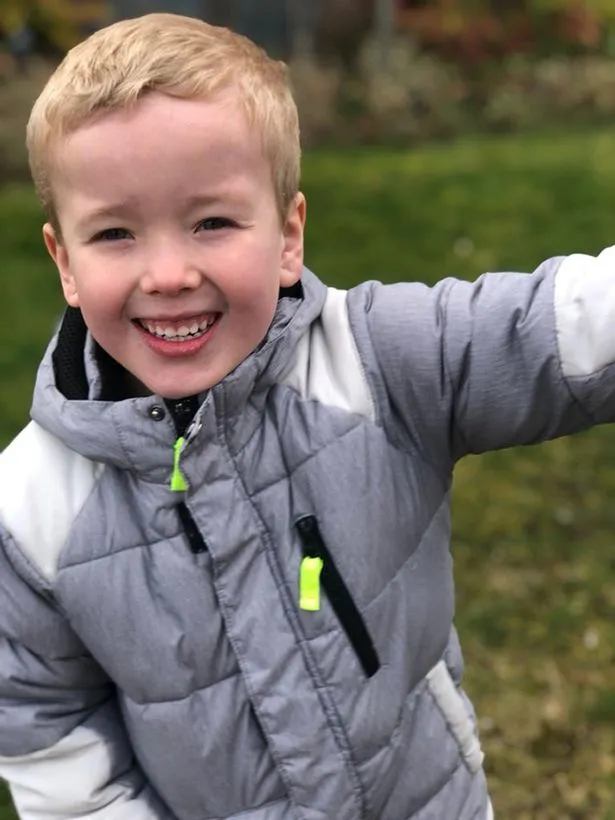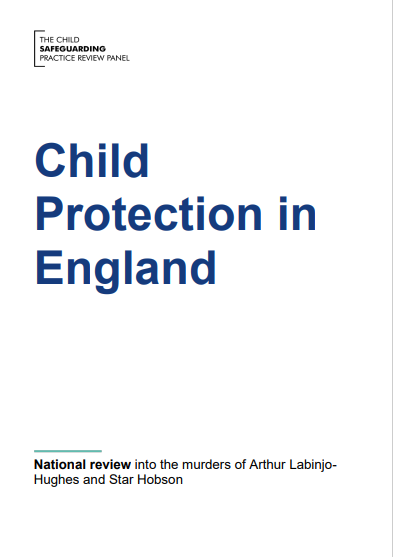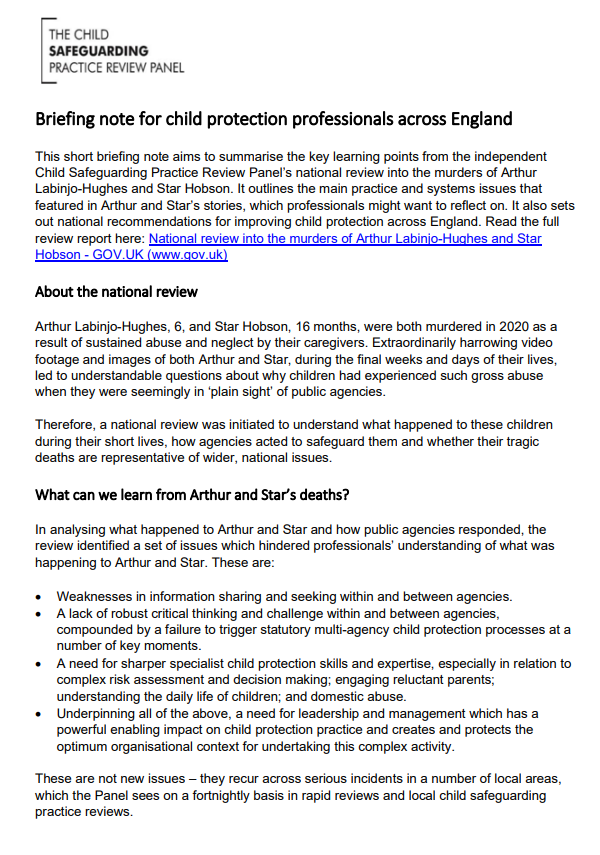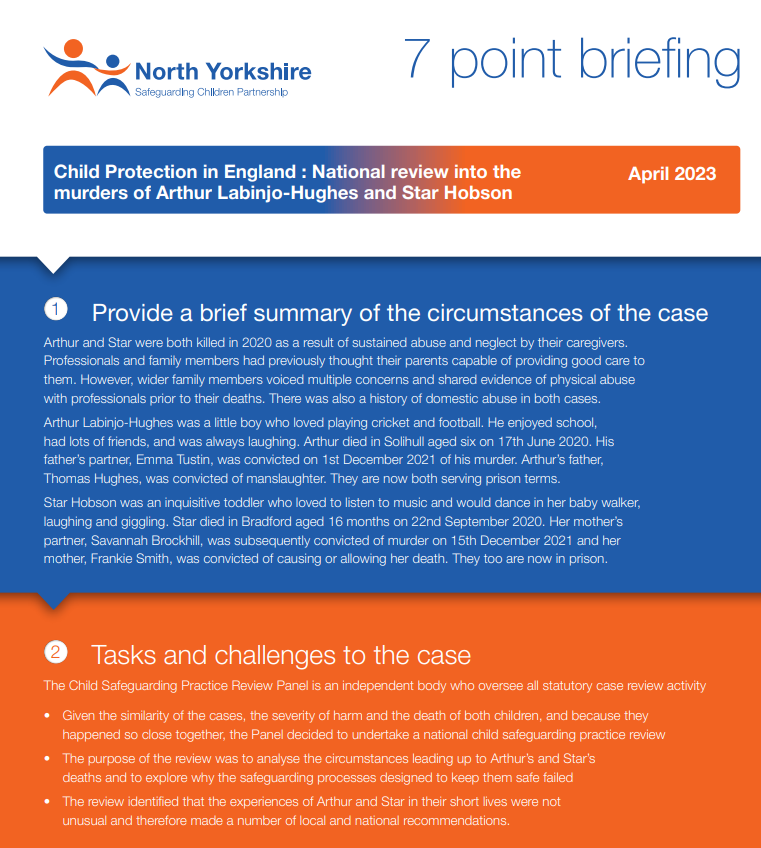National review into the murders of Arthur Labinjo-Hughes and Star Hobson
Introduction:
Arthur Labinjo-Hughes, 6, and Star Hobson, 16 months, were both murdered in 2020 as a result of sustained abuse and neglect by their caregivers. As a result of their murders a national review was initiated to understand what happened to these children during their short lives, how agencies acted to safeguard them and whether their tragic deaths are representative of wider, national issues.
This briefing aims to summarise the key learning points and recommendations from the Child Safeguarding Practice Review Panel’s national review into the murders of Arthur Labinjo-Hughes and Star Hobson. It is also a collation of key resources and training that partners can access in relation to learning points and recommendations that were highlighted in the review.


Partnership Learning event
In 2022 The Child Safeguarding Practice Review Panel released the “Child Protection In England” document. This review sets out recommendations and findings for national government and local safeguarding partners to protect children at risk of serious harm.
It examines the circumstances leading up to the deaths of Arthur Labinjo-Hughes and Star Hobson and considers whether their murders reflect wider national issues in child protection.
Following the release of the document North Yorkshire Safeguarding Children Partnership completed a series of exercises in order to reflect on the learning form the report and collate ley updates and training resources to share with wider partners.
The masterclass detailed the work that has been completed by the partnership, looking at key learning themes from the report and the impact the report has had on partners practice from Children and Families service, community safety, North Yorkshire police and Health services (HDFT and TEWV).
A review of the findings can also be found:
Partnership briefing:
A task and finish group was established to examine the briefing and share the key findings recommendations across the partnership. The work completed by the task and finish group can be found here.
Key Learning Themes, Resources and Additional Training:
Learning from Star and Arthur report.
The impact of domestic abuse on Arthur and Star was not explored in depth; concerns about domestic abuse towards Star’s mother were considered episodically and not investigated sufficiently; information about Emma Tustin’s history of domestic abuse was not triangulated between agencies.
What’s being done as partnership?
Domestic Abuse Local Partnership Boards are in operation for North Yorkshire reporting into the North Yorkshire Community Safety Partnership North Yorkshire DA Local Partnership Board is now lead by an Independent Chair appointed in September 2022. Underpinning both boards is the Support offered across the spectrum of domestic abuse support services commissioned to IDAS for victims, survivors and the behavioural change programmes delivered by Foundation.
Since the inception of the Domestic Abuse Act 2021 North Yorkshire and City of York Authorities have introduced distinct strategic Domestic Abuse Partnership Boards as defined by Part 4 of the Act.
North Yorkshire’s Board is chaired by an Independent Chair and reports into the North Yorkshire Community Safety Partnership. Underpinning the DA Local Partnership Board are several sub-groups;
Multi Agency Risk Assessment Conference (MARAC): These are daily meetings across North Yorkshire where agencies work collaboratively to share information, knowledge and ultimately safety planning to support victims and their children who are at the highest risk of harm of domestic abuse. Agencies with information will submit MARAC referrals into the group to the MARAC Chair who will then coordinate and share the flow of information to form a suite of plans and measures to further safeguard the most vulnerable victims of domestic abuse from harm.
Domestic Abuse Tactical Group: Formed during the COVID 19 Pandemic to monitor the operational and tactical response to the continued oversight of service delivery in support of victims of abuse. Agencies involved are Police Local Authorities and OPFCC, Probation. Meeting fortnightly to review demand and share an understanding of change and organisational development and communications locally and nationally.
Department for Levelling Up Housing and Communities working Group (DLUCH): This is a small group of only North Yorkshire and City of York Local Authorities formed to coordinate the funding provided by the government in support of the Safe Accommodation Duties under part 4 of the DA Act 2021 and to then monitor how individual workstreams are developing.
Domestic Abuse Joint Commissioning Group: This is a quarterly strategic commissioning meeting with a number of agencies that come together to discuss performance and developments of commissioned services for victims and survivors including perpetrator programmes currently in place across North Yorkshire and City of York authorities in respect of Domestic Abuse and Violence Against Women and Girls (VAWG)/ Sexual Violence.
North Yorkshire Council and City of York Council have currently commissioned a number of work streams to better understand the needs of the most vulnerable victims of abuse in our communities through the following areas of activity.
· Strategic Needs assessment and wider system review of Domestic Abuse across NYCC & CYC
· Implementation of Multi Agency DA Training for frontline professionals to better understand signs indicators and working with marginalised groups and young and older people.
· DA Housing Accreditation scheme (DAHA). NYCC has created a coordination role to implement the accreditation scheme across housing stock holders.
· NYCC have worked with Horton Housing to create a DA Community Support officer role to work across 4 Gypsy Roma Traveller sites to support communities grow awareness of healthy relationships and support and build trust.
· NYCC has injected funding to grow resourcing within the IDAS Hub (central referral point into service) to ensure victims have a speedy service response as calls for demand grow.
Key learning/training and resources for partners.
NYSCP (safeguardingchildren.co.uk) – Practice Guidance
IDAS North Yorkshire Training Programme Overview (safeguardingchildren.co.uk)
North Yorkshire and City of York Training – IDAS Online Training Courses
Learning from Star and Arthur report.
· The review highlighted weaknesses in information sharing and seeking within and between agencies.
· Lack of timely and appropriate information sharing, for example, photographs of bruising to Arthur were not shared with the MASH; and limited information seeking, for example, concerns raised by Arthur and Star’s family members were not unpicked.
What’s being done as partnership?
Training and guidance is offered across all statutory partners to ensure that all staff are compliant with information sharing protocols.
One Minute Guide has been developed and is shared regularly across wider partners so that practitioners have an accurate understanding of what information should be shared and when.
Harrogate District Foundation Trust (HDFT) have submitted a business case for further investment within the MAST. HDFT have put in place an interim Named Nurse for the front door for a higher level of management insight and scrutiny.
North Yorkshire Police have rolled out training around the Public Protection notification reports and have developed a pneumonic (AWARE) to assist officers to record the full circumstances and concerns and the voice of the child along with accurately recording consent to share. This has been rolled out to all NYP officers.
We have key working relationships within MAST between NYP, CSC and Health. As part of the process, we have regular monthly audits to look at the quality of referrals and decision-making practice is scrutinised and learning taken forward for all. NYP are currently developing some further training for officers around PPN submissions. We have identified that it needs to be an ongoing rolling process to ensure the key points remain at the forefront of officer’s minds when completing referrals.
Key learning/training and resources for partners.
Fears about sharing information cannot be allowed to stand in the way of the need to safeguard children, young people or adults at risk of abuse or neglect. No practitioner should assume that someone else will pass on information which may keep a child, young person or adult at risk safe.
Practitioners should use their professional judgement when making decisions on what information to share and when. They should follow their organisation’s procedures, any information sharing agreements in place with their organisation and their partners, and consult with their legal department/seek legal advice if in doubt. The most important consideration is whether sharing information is likely to safeguard and protect a child, young person or adult at risk.
NYSCP (safeguardingchildren.co.uk) Information Sharing OMG
Information sharing: advice for practitioners (publishing.service.gov.uk)
Learning from Star and Arthur report.
· The report highlighted a lack of robust critical thinking and challenge within and between agencies.
· Working with families whose engagement is reluctant and sporadic – in Arthur and Star’s stories, professionals were increasingly kept at arm’s lengths by the perpetrators. There was also signs of parental avoidance.
· Critical thinking and challenge – there were missed opportunities for critical thinking and challenge within and between agencies and to consider information altogether e.g. Strategy Meetings were not held prior to the home visit to see Arthur and before Star’s Child Protection Medical.
What’s being done as a partnership.
Recommendations around developing expert practitioner roles who require a five-year assessed career framework. HDFT Specialist Safeguarding Nurses now carryout Student SCPHN and newly qualified safeguarding preceptorship. This is around a year in total.” This ensures they have sharper specialist child protection skills and can manage and have oversight of complex cases which would include co working cases”. ( Arthur and Star National panel Review May 22 ).HDFT have also developed new band 7 roles to concentrate on complex cases which involves visiting families and co-working cases. These band 7 roles will receive supervision on a monthly basis from the Lead Named Nurse for Safeguarding and CIC.
TEWV: Remaining professionally curious, ensuring that we are continually assessing a situation and recognising the impact that changing family dynamics can have. This includes a new partner, consider what this means for the safety of the children. Training highlights that a lack of professional curiosity and professional challenge can be a theme throughout Safeguarding Adult Review’s, Domestic Homicide Review’s and Hughes Children’s Safeguarding Practice Review (CSPR’s), and is a recurring theme in many other reviews
North Yorkshire Police (NYP) encourage and train officers as part of the police degree apprentice to be professionally curious and look beyond the obvious when attending incidents. NYP have recently rolled out child protection training focusing on missing and exploited children. Officers have been provided advice and guidance around signs and indicators and the impact the can have in recognising those and completing the appropriate referrals for support.
NYP promotes early intervention and prevention across the organisation to ensure officers look to provide a problem solving approach and involve the right services at the earliest opportunity will provide a better outcome for the individual and in turn reduce demand on and calls to services.
Key learning/training and resources for partners.
NYSCP (safeguardingchildren.co.uk) – Professional curiosity and challenge – Guidance for practitioners.
Having Difficult Conversations with Parents:
You need to arrange a meeting with a family and you know that it is going to be very difficult, or they may not even attend, but this course will help you work towards positive engagement. The session will deliver advice and ideas around how to structure meetings with parents, even the most difficult ones. NYSCP (safeguardingchildren.co.uk)
Understanding the threshold –safe uncertainty.
These sessions explore how decisions are made in relation to the NY Safeguarding Children Partnership Threshold Guide & different agencies perspectives, to provide the right support at the right time. How do we know as professionals when to be concerned about a child? Find out more about the different threshold levels and what steps to put in place when you have concerns. NYSCP (safeguardingchildren.co.uk)
Learning from Star and Arthur report.
· Understanding what the child’s daily life is like, where this might not be straightforward with both Arthur and Star there was limited direct work. Additionally, the histories of those involved in their lives, e.g. Frankie Smith and Savannah Brockhill, were not looked into sufficiently.
· Listening to the views of the wider family and those who know the child well – in Arthur and Star’s stories a significant gap was the failure to talk to and listen to wider family members.
· Working with diverse communities – assumptions and biases relating to culture, ethnicity, gender and sexuality affected how practitioners understood Arthur and Star’s daily experiences and risks to their safety.
What’s being done as partnership?
North Yorkshire County Council Children and Young People’s Service has adopted Signs of Safety, the core philosophy for working with children and families across North Yorkshire.
This will ensure that a proven, evidence-based practice framework is used across all services creating consistent and inclusive experience across North Yorkshire for children and families in receipt of services.
Guidance is available to practitioners to ensure assessment undertaken draw on analysis from all relevant professionals, wider family members or other adults who try and speak on behalf of the child and the child voice themselves.
HDFT have developed a New Child Lived experience practitioner role to ensure the voice of the child can be captured using pictures and drawings. This role is the only role like it in the NHS. We are already building evidence of how this supports the child to share their wishes and feelings and use this to ensure that the right level of support is in place for the child.
The child Lived Experience work is being developed with all levels of staff so it will become an integral way of working.
NYP have developed the AWARE pneumonic for officers to have in mind and complete on the referrals. It focuses on the following areas Appearance, Words, Activity, Relationships & dynamics in regard to the whole family and so keeps in officers minds the whole family approach.
TEWV – Star Hobson and Arthur Labinjo-Hughes briefings have been shared across the trust. A new training package has been developed trust wide across our 8 localities. Within the new package Star and Arthur’s Child Safeguarding Practice Review is embedded. TEWV encourage practitioners to integrate a ‘Think Family approach’ into their workday and make it relevant.
Key learning/training and resources for partners.
NYSCP (safeguardingchildren.co.uk) Strength in Relationships Practice Model
NYSCP (safeguardingchildren.co.uk) Early Help OMG
Safeguarding children: Virtual classroom training that focusses on how to recognise when children are at risk of being harmed and how to safeguard them appropriately. NYSCP (safeguardingchildren.co.uk)
Signs of Safety Conferencing Pathway (previously known as Comprehensive Child Protection Pathway): Provides delegates with an understanding of the Child Protection Pathway including strategy meetings, core groups and child protection conferences. NYSCP (safeguardingchildren.co.uk)
Direct Work Tools: You can see that a child is worried, anxious or appears upset but you don’t know why. This will provide you with resources to support young people to articulate their thoughts, feelings & wishes. NYSCP (safeguardingchildren.co.uk)
Early Help Assessments & Running Successful Team around the Family Meetings: The course will provide an understanding of Early Help Assessments (EHAs) and Team around the Family Meetings (TAFs) which are central to the NYCC Early Help Strategy. Are you concerned about a child in your care? Identify what support the child and the family might need by using the Early Help Assessment tool to explore what’s going on for them and how to help their situation. NYSCP (safeguardingchildren.co.uk)
Early Help and Child Protection Referrals: Virtual Classroom training to clarify the referrals process for Early Help and Child Protection thresholds. NYSCP (safeguardingchildren.co.uk)
Family Networks: The saying ‘it takes a village to raise a child’ remains true today. These sessions will explore what this means and how this process can support a child and their family. We will look at the role that a ‘Family network’ can play in assisting a child and their parents/carers help overcome difficulties, by using a network of friends and family as a means of ongoing support. NYSCP (safeguardingchildren.co.uk)
Key learning/training and resources for partners.
Learning from the Star and Arthur Report:
In Arthurs case – although Emma (father’s partner) was offered access to community mental health support, there was not wider consideration of the risks of her own children, or Arthur given the mental health difficulties she had described.
There was no direct liaison between children’s services and adult mental health services in understanding the safeguarding needs of the children.
PAMIC: This tool is to be used when considering how likely and with what severity an adult’s mental ill health will impact on a child. It involves the practitioner thinking about the nature of risk and also the protective factors for the child so it includes the practitioner’s professional judgement. NYSCP (safeguardingchildren.co.uk)
What’s being done as a partnership:
In MAST all referrals where it is identified that an adult has care and support needs are screen jointly between police social care and mental health services. The children connected to the referral are screened jointly between police and social care. This ensures we are sharing the right information and taking a whole family approach making joint decisions for the intervention at the right time and tailored to the families needs.
Parental Mental Health and the Impact on children (PAMIC) – We remind practitioners that it is essential when working with parents/carers of children to consider the impact of parental/carer mental health on the child/ren but also the impact of the parental/carer role on the service user(s). We strengthen to practitioners trust wide that PAMIC is for any service user who has caring responsibility of a child or children, for example, grandparents, aunts/uncles, family, friends etc. TEWV participate and are visible in national, reginal, and local safeguarding events to work alongside partner agencies to convey a consistent message.
Key learning/training resources for partners.
Children of Parents with Mental Health Problems (proceduresonline.com)
NYSCP (safeguardingchildren.co.uk) – One Minte Guide Parental Mental Ill Health in Children
The Go-To – Emotional wellbeing and mental health (thegoto.org.uk) – If you work with children and young people, you’ll know that they experience a wide range of feelings, emotions and challenges. The Go-To contains resources, links and information to support professionals in North Yorkshire.
Head First is North Yorkshire’s Mental Health Training Hub, a resource that has been developed to provide information on mental health, suicide prevention and training in and across the County.
Supporting Children and Young People’s Social and Emotional Mental Health: This Mini Marketplace session will provide an overview of the different provision available to support children and young people’s social & emotional mental health. Delegates will develop an understanding of the services and support provision available in North Yorkshire, including information on how to access this. NYSCP (safeguardingchildren.co.uk)
Trilogy of Risk: Virtual classroom training looking at the impact of parental mental ill health; substance misuse and domestic abuse in families. NYSCP (safeguardingchildren.co.uk)
PAMIC: This tool is to be used when considering how likely and with what severity an adult’s mental ill health will impact on a child. It involves the practitioner thinking about the nature of risk and also the protective factors for the child so it includes the practitioner’s professional judgement.
Learning from Star and Arthur report.
Report: 2.12 This is the critical period in Arthur’s story. The response by professionals to concerns about bruising to Arthur involved a number of significant Key Practice Episodes.
4.6. The response to concerns about bruising to Arthur was undermined by the lack of a multi-agency strategy discussion, which should always be triggered when there are allegations about the suspected abuse of children.
What’s being done as partnership?
Child Protection medical assessment document reviewed and shared across partnership.
HDFT -New Physical abuse training being developed which is concentrating on mechanism of injury, this will include paediatricians and equip staff with the knowledge to challenge.
HDFT are utilising training from Walsall which is an MS team’s partnership conference in relation to Star and Arthur, including learning and next steps.
Key learning/training and resources for partners.
NYSCP (safeguardingchildren.co.uk) – managing injuries in Non-independently mobile children – practice guidance.
NYSCP (safeguardingchildren.co.uk) – Child Protection Medical Assessments
83963_DH-7-point-briefing.pdf (safeguardingchildren.co.uk)
Questions you might want to reflect upon as a practitioner:
We have set out below some questions that you might want to reflect upon as a practitioner either individually, as part of supervision, or as a group:
- How do you work with other agencies to build a full picture of what is happening in a child’s life?
- What behavioural biases, e.g. confirmation bias, might impact upon your information sharing and seeking practice?
- Do you consistently speak to and listen to the views of family and friends who know a child well? What barriers can get in the way of you doing this?
- What assumptions might you hold relating to culture, ethnicity, gender and sexuality? In what ways might this affect your practice?
- What aspects of working with families whose engagement is reluctant and sporadic do you feel more/less confident with? What do you consider to be typical signs of parental avoidance?
- What opportunities do you have – formally or informally – to challenge decisions within your and other agencies and to consider different professionals’ perspectives?
Worried About a Child? Make a Referral

If you are worried about a child or suspect, they have suffered and/or are like to suffer significant harm it is your duty to make a referral for that child to find out how and for further information click here.







 View all our news
View all our news